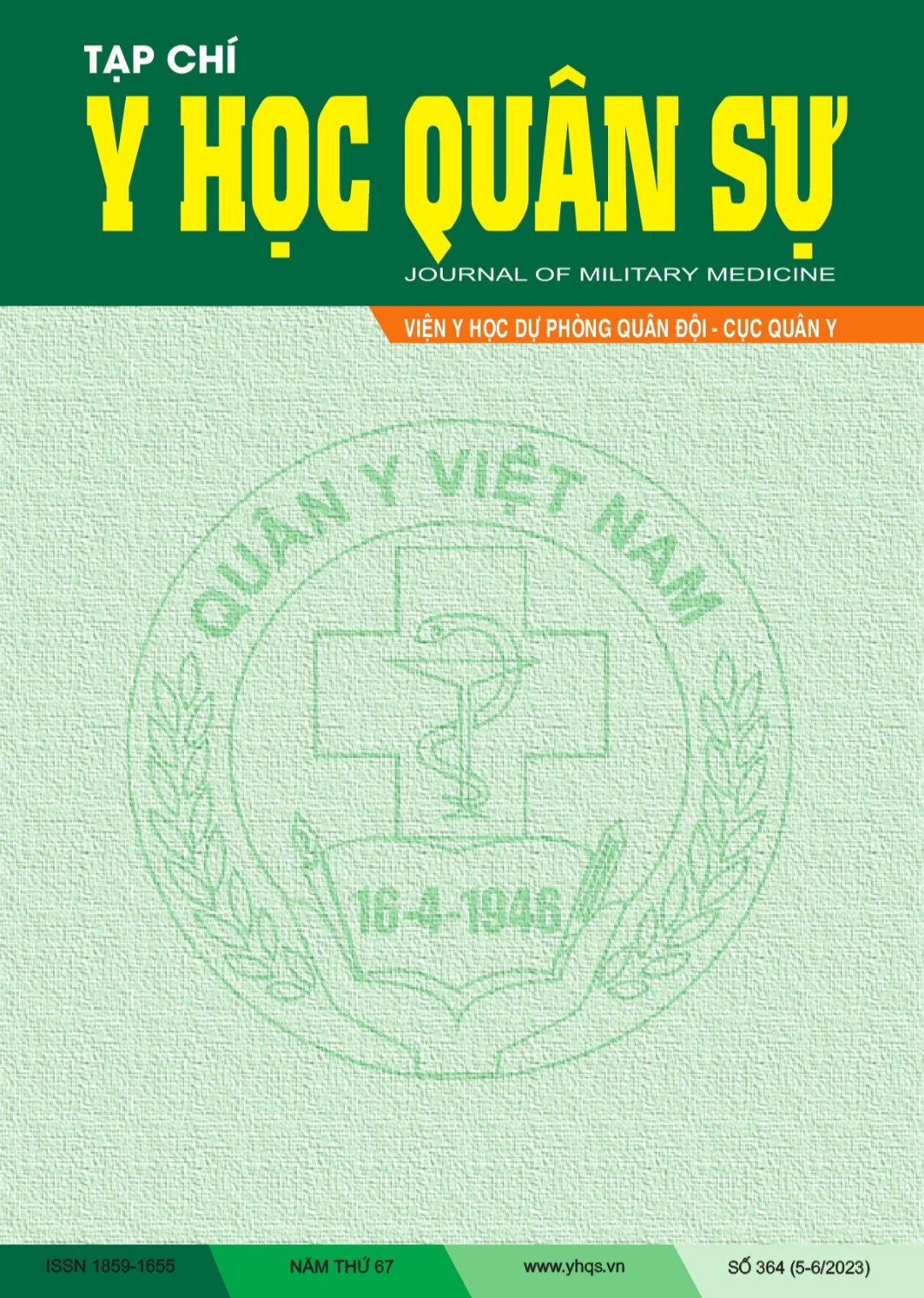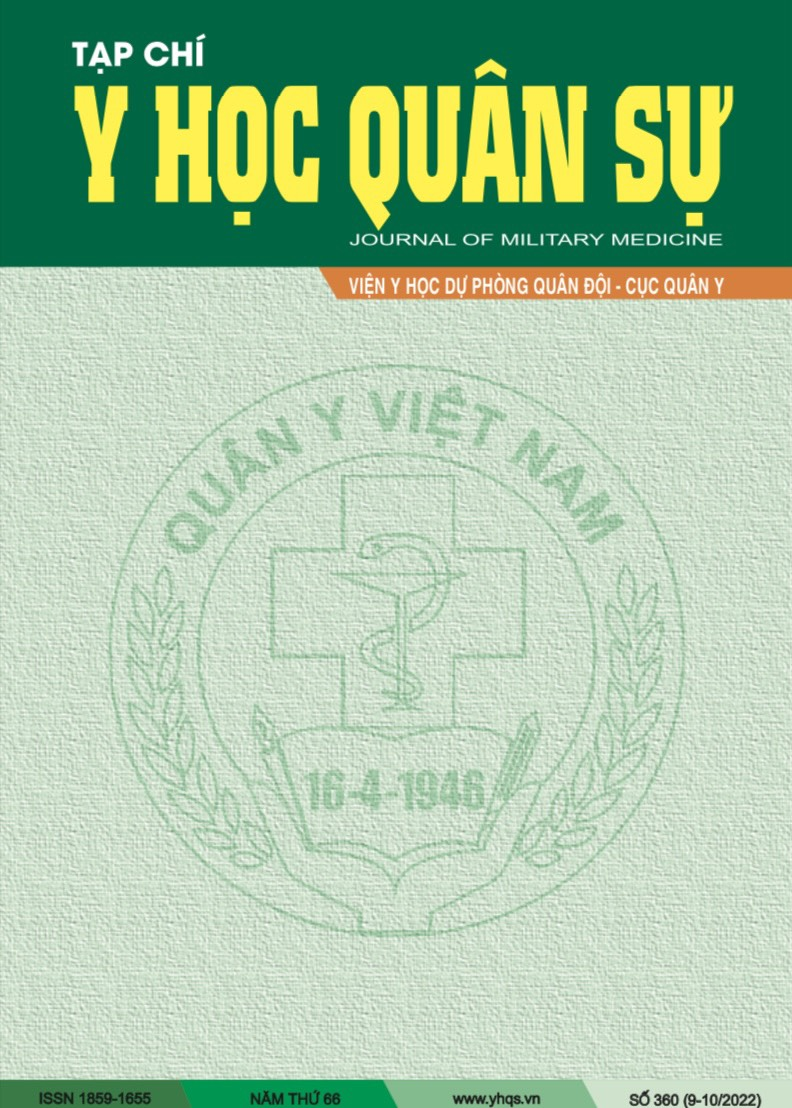NGHIÊN CỨU ỨNG DỤNG CÔNG NGHỆ GIẢI TRÌNH TỰ THẾ HỆ MỚI TRÊN HỆ GENE VI KHUẨN BURKHOLDERIA PSEUDOMALLEI
DOI:
https://doi.org/10.59459/1859-1655/JMM.75Từ khóa:
Meioidosis, B. pseudomallei, định danh, giải trình tự hệ geneTóm tắt
Mục tiêu: Bổ sung một kĩ thuật mới trong định danh vi khuẩn B. pseudomallei bằng công nghệ giải trình tự gene thế hệ mới.
Đối tượng và phương pháp: Ứng dụng kĩ thuật giải trình tự gene thế hệ mới trên hệ thống máy MiSeq (Illumina - Hoa Kỳ), giải trình tự toàn bộ hệ gene của hai chủng vi khuẩn B. pseudomallei. Đánh giá chất lượng giải trình tự gene bằng phần mềm FastQC. Định danh vi khuẩn bằng trình tự 16S rRNA sử dụng phần mềm Blast.
Kết quả: Phần mềm FastQC cho thấy điểm chất lượng Q đạt trên Q30 (độ chính xác của đọc trình tự là trên 99,9%), chỉ số N50 của hai chủng vi khuẩn là 36.559 bp và 74.123 bp. Phần mềm Blast cho kết quả ở cả 2 chủng vi khuẩn là B. pseudomallei với độ bao phủ và độ tương đồng đều đạt 100%. Trình tự kiểu gene (ST) được xác định là ST 541, với kiểu alen của các “house-keeping” genes là ace: 3, gltB: 4, gmhD: 2, lepA: 3, lipA: 5, narK: 4 và ndh: 1. Sử dụng công cụ ABRicate, gene kháng kháng sinh beta-lactam được xác định ở cả hai chủng. Sử dụng cơ sở dữ liệu VFDB, xác định được 165 gene độc lực ở chủng NTW 21.1 và 171 gene độc lực ở chủng SS 1 240’.
Tài liệu tham khảo
Hoàng Việt Hà, Bùi Nguyễn Hải Linh, Trần Thị Lệ Quyên, Phạm Thị Huyền, Hoàng Quang Trung, Trần Anh Đào, Nguyễn Vũ Trung, Trịnh Thành Trung (2020), “So sánh các kĩ thuật định danh B. pseudomallei trong xét nghiệm chẩn đoán bệnh Whitmore”, Tạp chí Khoa học và Công nghệ Việt Nam, số 62(5), 5/2020.
Alex R Hoffmaster, David AuCoin, Prasith Baccam, Henry C Baggett, Rob Baird, Saithip Bhengsri, David D Blaney, Paul J Brett, Timothy J.G Brooks, Katherine A Brown, Narisara Chantratita, Allen C Cheng, David A.B Dance, Saskia Decuypere, Dawn Defenbaugh, Jay E Gee, Raymond Houghton, Possawat Jorakate, Ganjana Lertmemongkolchai, Direk Limmathurotsakul, et al. (2015) “Melioidosis Diagnostic Workshop 2013”, Emerg Infect Dis.; 21(2): e141045. doi: 10.3201/eid2102.141045.
Andrews S (n.d), FastQC A Quality Control tool for High Throughput Sequence Data. www.bio-informatics.babraham.ac.uk/projects/fastqc/
Bankevich A, Nurk S, Antipov D, Gurevich A.A, Dvorkin M, Kulikov A.S, Lesin V.M, Nikolenko S.I, Pham S, Prjibelski A.D, Pyshkin A.V, Sirotkin A.V, Vyahhi N, Tesler G, Alekseyev M.A, Pevzner P.A (2012), “SPAdes: A new genome assembly algorithm and its applications to single-cell sequencing”, Journal of Computational Biology, 19(5), 455-477. https://doi.org/10.1089/cmb.2012.0021.
Bolger A.M, Lohse M, Usade B (2014), “Trimmomatic: a flexible trimmer for Illumina sequence data”, Bioinformatics, 30(15), 2114-20. https://doi.org/10.1093/bioinformatics/btu170.
Direk Limmathurotsakul, Nick Golding, David Ab Dance, Jane P Messina, David M Pigott, Catherine L Moyes, Dionne B Rolim, Eric Bertherat, Nicholas Pj Day, Sharon J Peacock, Simon I Hay (2016), “Predicted global distribution of B. pseudomallei and burden of melioidosis”. Nat Microbiol.; 1(1):15008.
doi: 10.1038/nmicrobiol.2015.8.
Ea Zankari, Henrik Hasman, Salvatore Cosentino, Martin Vestergaard, Simon Rasmussen, Ole Lund, Frank M Aarestrup, Mette Voldby Larsen (2012), “Identification of acquired antimicrobial resistance genes”, J Antimicrob Chemother. 67(11): 2640-4. doi: 10.1093/jac/dks261. Epub 2012 Jul 10.
Esther M Gabor, Erik J de Vries, Dick B Janssen (2003), “Efficient recovery of environmental DNA for expression cloning by indirect extraction methods”, FEMS Microbiol Ecol.; 44(2):153-63.
doi: 10.1016/S0168-6496(02)00462-2.
Feldgarden M, Brover V, Gonzalez-Escalona N, Frye J.G, Haendiges J, Haft D.H, Hoffmann M, Pettengill J.B, Prasad A.B, Tillman G.E, Tyson G.H, Klimke W, “AMR FinderPlus and the Reference Gene Catalog facilitate examination of the genomic links among antimicrobial resistance, stress response, and virulence”, Sci Rep. 2021 Jun 16; 11(1):12728. doi: 10.1038/s41598-021-91456-0. PMID: 34135355; PMCID: PMC8208984.
Hara Y, Mohamed R, Nathan S, et al. (2013), “Epidemiology of melioidosis in Asia and the Pacific: a systematic review”, PloS Neglected Tropical Diseases 7(6): e2455. https://doi.org/10.1371/journal.pntd.0002455.
http://www.bt.cdc.gov/agent/agentlist-category.asp
Koichiro Tamura, Glen Stecher, Sudhir Kumar (2021), “MEGA11: Molecular Evolutionary Genetics Analysis version 11”, Molecular Biology and Evolution, 38:3022-3027.
Liu B, Zheng D, Jin Q, Chen L, Yang J (2019), “VFDB 2019: a comparative pathogen-omic platform with an interactive web interface”, Nucleic Acids Research. 47, D1, D687-D692. https://doi.org/10.1093/nar/gky1080.
Nguyen L.T, Schmidt H.A, von Haeseler A, Minh B.Q (2014), “IQ-TREE: A Fast and Effective Stochastic Algorithm for Estimating Maximum-Likelihood Phylogenies”, Molecular Biology and Evolution, 32(1), 268-274. https://doi.org/10.1093/molbev/msu300.
Page A.J, Cummins C.A, Hunt M, Wong V.K, Reuter S, Holden M.T.G, Fookes M, Falush D, Keane J.A, Parkhill J (2015), “Roary: rapid large-scale prokaryote pan genome analysis”. Bioinformatics, 31(22), 3691-3693. https://doi.org/10.1093/bioinformatics/btv421.
Quyen T.L Tran, Phuc H Phan, Linh N.H Bui, Ha T.V Bui, Ngoc T.B Hoang, Dien M Tran, Trung T Trinh (2022), “Child Melioidosis Deaths Caused by B. pseudomallei Contaminated Borehole Water, Vietnam, 2019”, Emerg Infect Dis.; 28(8): 1689-1693. doi: 10.3201/eid2808.220113.
Sabine Lichtenegger, Trung T Trinh, Karoline Assig, Karola Prior, Dag Harmsen, Julian Pesl, Andrea Zauner, Michaela Lipp, Tram A Que, Beatrice Mutsam, Barbara Kleinhappl, Ivo Steinmetz, Gabriel E Wagner (2021), “Development and Validation of a B. pseudomallei core genome multilocus sequence typing scheme to facilitate molecular surveillance”. J Clin Microbiol.; 59(8): e00093-21. doi: 10.1128/JCM.00093-21.
Seemann T (2013), Barrnap 0.8 : rapid ribosomal RNA prediction.
Seemann T (2014) “Prokka: rapid proka-ryotic genome annotation”, Bioinformatics, 30(14), 2068-2069, doi.org/10.1093/bioinformatics/btu153
Seemann T (2016), “”MLST: Scan contig files against PubMLST typing schemes. https://github.com/tseemann/mlst.
Seemann T (2016), ABRicate: mass screening of contigs for antiobiotic resistance
Simão F.A, Waterhouse R.M, Ioannidis P, Kriventseva E.V, Zdobnov E.M. (2015), “BUSCO: assessing genome assembly and annotation completeness with single-copy orthologs”, Bioinformatics, 31(19), 3210-3212. doi.org/10.1093/bioinformatics/btv351
Tải xuống
Đã Xuất bản
Cách trích dẫn
Số
Chuyên mục
Chấp nhận đăng 24-06-2023
Ngày xuất bản 27-06-2023



